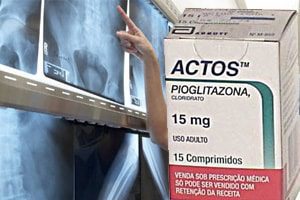
The findings of a new study should provide even more caution to those taking or considering Actos as a means of lowering their body’s glucose level. According to a study funded in part by the European Association for the Study of Diabetes, taking thiazolidinedione drugs like pioglitazone (Actos) and rosiglitazone instead of other drugs that aim […]
 The findings of a new study should provide even more caution to those taking or considering Actos as a means of lowering their body’s glucose level.
The findings of a new study should provide even more caution to those taking or considering Actos as a means of lowering their body’s glucose level.
According to a study funded in part by the European Association for the Study of Diabetes, taking thiazolidinedione drugs like pioglitazone (Actos) and rosiglitazone instead of other drugs that aim to lower glucose increases a person’s risk of suffering a hip fracture. The risk is highest for a distal hip fracture, mostly among women, though men do face a significantly increased risk of suffering similar consequences while taking TZDs.
Using a database containing information on more than 200,000 Scots afflicted with type 2 diabetes was used for the study. Researchers looked at information related to prescription drugs taken, hospital admissions, and deaths among this large group for the study. In the Methods summary of the report on the study appearing in the journal Diabetologia, researchers say they used “discrete-time failure analysis was used to model the effect of cumulative drug exposure on hip fracture during 1999–2008.”
The risk of suffering a hip fracture while taking Actos appears to increase with time on the drug and researchers summarize that “hip fracture increased with cumulative exposure in both men and women and risks were similar for pioglitazone and rosiglitazone. Among the patients who were exposed to sulfonylureas, metformin, or insulin, the risk of suffering a hip fracture was not present.
There are warnings on the labels of Actos, specifically, that acknowledge the risk of bone fractures (particularly of the hip) while taking Actos in the treatment of type 2 diabetes. However, it is the other risks associated with taking Actos that have increased scrutiny of the drug in the last few years.
Actos quickly became the top-selling drug treatment for type 2 diabetes after the previous top-seller was largely removed from the market amid safety concerns of its own.
It was not until late 2010 that the Food and Drug Administration warned that taking Actos at high doses or for longer periods of time could increase a person’s risk of suffering a life-threatening form of bladder cancer.
Thousands of people have now come forward who believe they’ve either contracted bladder cancer or have unknowingly put at risk of this life-threatening disease because the makers of the drug, Japan-based Takeda Pharmaceuticals, hid evidence that showed its popular drug was linked to this dangerous side effect.


